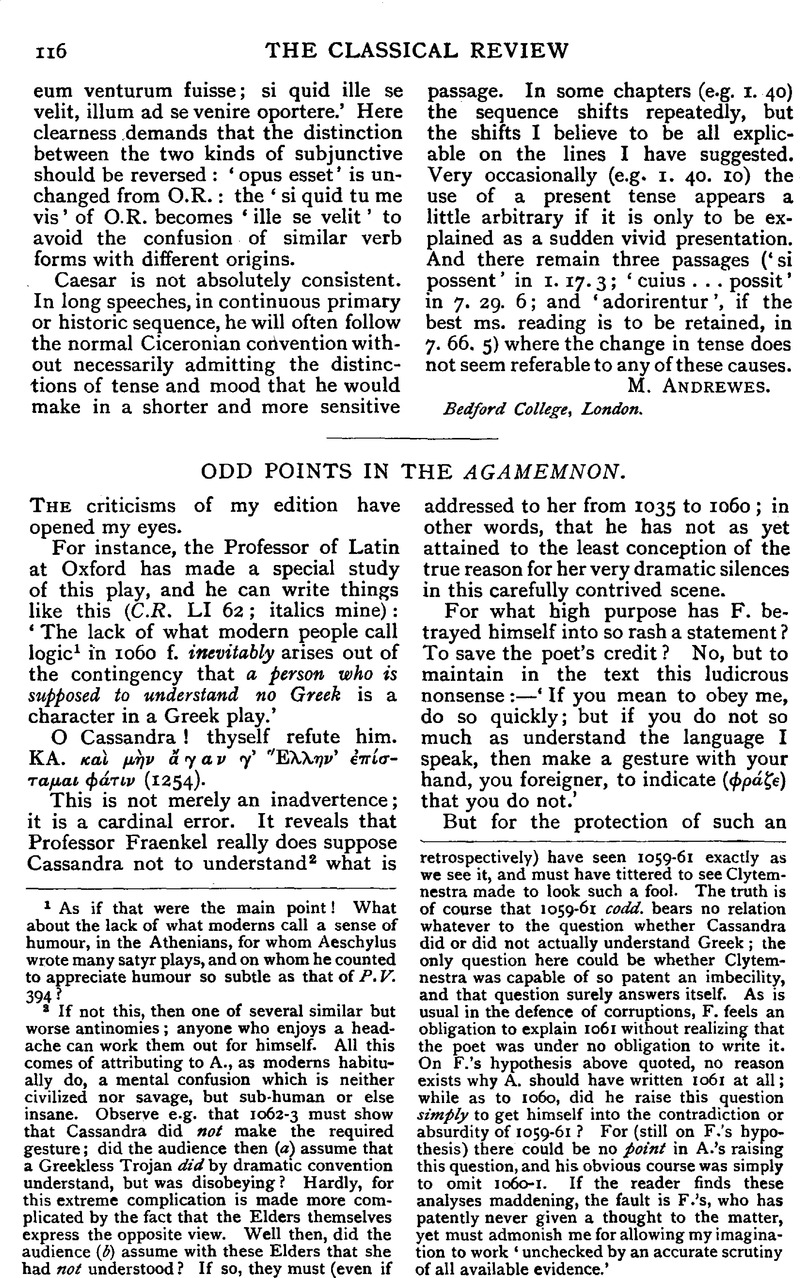No CrossRef data available.
Article contents
Odd Points in the Agamemnon
Published online by Cambridge University Press: 27 October 2009
Abstract

Information
- Type
- Review Article
- Information
- Copyright
- Copyright © The Classical Association 1937
References
page 116 note 1 As if that were the main point! What about the lack of what moderns call a sense of humour, in the Athenians, for whom Aeschylus wrote many satyr plays, and on whom he counted to appreciate humour so subtle as that of P. V. 394?
page 116 note 2 If not this, then one of several similar but worse antinomies; anyone who enjoys a headache can work them out for himself. All this comes of attributing to A., as moderns habitually do, a mental confusion which is neither civilized nor savage, but sub-human or else insane. Observe e.g. that 1062–3 must show that Cassandra did not make the required gesture; did the audience then (a) assume that a Greekless Trojan did by dramatic convention understand, but was disobeying ? Hardly, for this extreme complication is made more complicated by the fact that the Elders themselves express the opposite view. Well then, did the audience (b) assume with these Elders that she had not understood ? If so, they must (even i retrospectively) have seen 1059–61 exactly as we see it, and must have tittered to see Clytemnestra made to look such a fool. The truth is of course that 1059–61 codd. bears no relation whatever to the question whether Cassandra did or did not actually understand Greek ; the only question here could be whether Clytemnestra was capable of so patent an imbecility, and that question surely answers itself. As is usual in the defence of corruptions, F. feels an obligation to explain 1061 without realizing that the poet was under no obligation to write it. On F.'s hypothesis above quoted, no reason exists why A. should have written 1061 at all; while as to 1060, did he raise this question simply to get himself into the contradiction or absurdity of 1059–61? For (still on F.'s hypothesis) there could be no point in A.'s raising this question, and his obvious course was simply to omit 1060–1. If the reader finds these analyses maddening, the fault is F.'s, who has patently never given a thought to the matter, yet must admonish me for allowing my imagination to work ‘unchecked by an accurate scrutiny of all available evidence.’
page 117 note 1 Parallels enough (add, with Paley, PI. Crat. 422e) can be cited for interchange of ideas by the band, but here the assumption would be that there was some recognized movement of the hand by which you indicated noncomprehension, and I know of no authority for that, nor does it seem at all probable.
page 117 note 2 And the aim succeeded. This is why Lawson (p. vii) could make, in a work published by the Cambridge University Press, and no reviewer impugn, the statement that Wecklein, who had in fact provided two commentaries on the Agam., had not provided one. Again, in the current issue of C.Q. (XXXI 93) a contributor writing on Agam. II inquires whether ‘it would be too rash’ to suggest ‘another etymology’ for the name Clytaemnestra : ‘deviser of famed deeds’ (kλυ![]() ς, μησ
ς, μησ![]() ωρ). Scholars know that this etymology is about a millennium old, appearing as it does in the Etym. Magn.; but even beginners can learn as much from consulting Wecklein on this very line. For what author other than A. is it de rigueur to ignore the best commentary?
ωρ). Scholars know that this etymology is about a millennium old, appearing as it does in the Etym. Magn.; but even beginners can learn as much from consulting Wecklein on this very line. For what author other than A. is it de rigueur to ignore the best commentary?
page 117 note 3 Or ‘to lay the blame upon his policy,’ viz. of going to war. The blame for what? ψέγειν of course refers to its context, 187, which is further defined by the whole of 188–97; the blame for those disasters. Those who keep μáντιν have to make ψέγων mean ‘laying the blame for [199–204]’; now consider the involution : that passage is (i) very far away, (ii) separated by an έπεί δέ καί, (iii) separated by an eleven-line description of disasters which the reader (and audience) must be careful not to relate to ψέγων!

